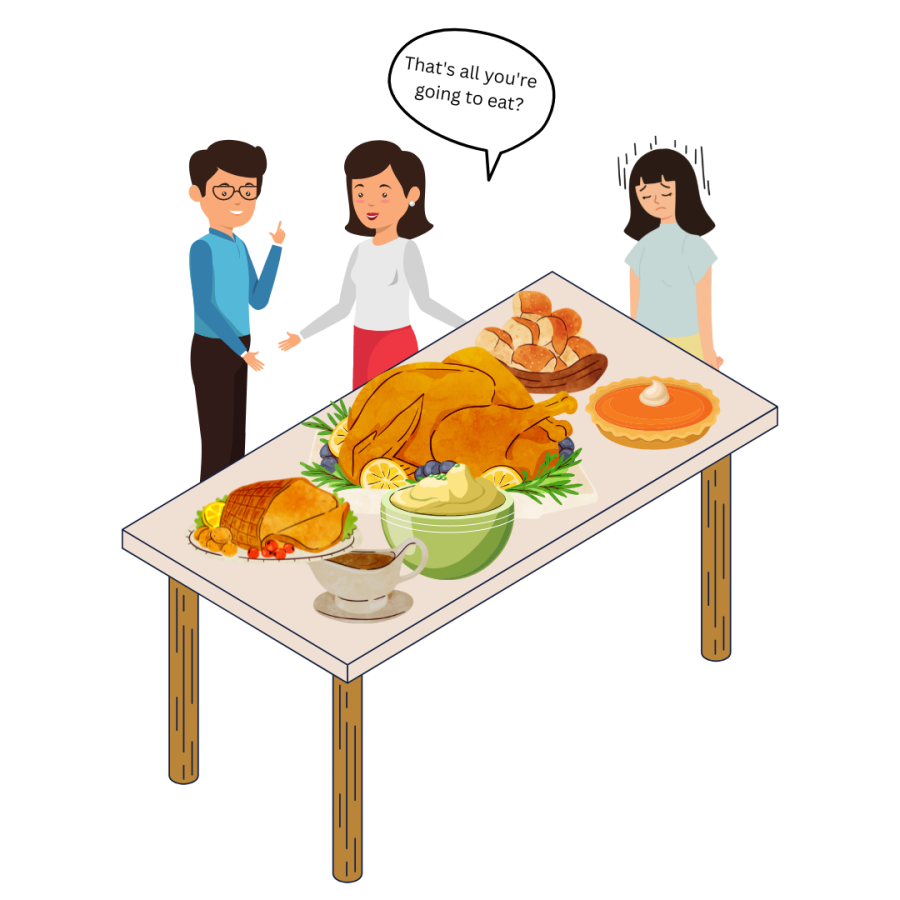Keep your eyes on your own plate
Let’s leave the judgmental comments behind this holiday season
December 23, 2022
Getting into the holiday spirit is not something that comes easily to everyone. Though most people get excited for Thanksgiving food and gift giving, some find it to be one of the most stressful and chaotic times of the year. There are a lot of different stressors that can prompt someone to feel anxiety during the holidays, many having to do with family gatherings and big meals.
It is very common for extended family members to either come into town and stay at their family’s home in Lincoln, or some may leave to visit family elsewhere. Either way, a large amount of time is usually spent with relatives, who you may or may not feel comfortable being around so consistently. An anonymous voluntary survey of 44 LSE students shows that 69.8 percent of students experience stress around the holidays, and 52.3 percent find the stress to come from being around family members.
Sophomore Emi Taylor describes the way she feels when spending the holidays with extended family to be nerve-racking, especially in such a condensed period of time.
“All of my family from [Lincoln] come to my house two times out of the year and they’re both scrunched together,” Taylor said. “It’s just a lot of expanded family in a small amount of time.”
Something else that can induce stress is the idea of being expected to stuff your face during Thanksgiving dinner, which simply isn’t realistic for everyone. Family members often have expectations about finishing a full plate, yet may also criticize you for eating “too much” during this meal.
For those fortunate enough to have a big meal on these holidays, being around a lot of family can make dinner a bit harder. This can affect more people than you may think when struggling with some form of disordered eating. Whether diagnosed or not, many teens deal with anxiety towards food.
This is very easily heightened when sitting in front of a dinner table presenting a full-size turkey, mashed potatoes, green bean casserole, cranberry sauce, and pumpkin pie with aunts and uncles, grandparents and other extended family members sitting around as well.
Taylor shares her struggle with eating in front of other people and says that in the past she has felt like she was being judged for what she was eating. She can recall comments that family members have made such as “Are you sure you’re going to eat all of that?” and “That seems like a lot of food for you.”
“I just feel kind of small,” Taylor said. “I feel like I have to shrink back into my chair and just be really careful of what I’m doing.”
According to Eating Disorder Hope, this feeling is not uncommon. It states that it can be beneficial for people struggling with disordered eating to create a plan before attending your Thanksgiving dinner. For example, setting boundaries before the meal begins. If you establish that you are uncomfortable around the table, or just want to make it a comment free space, it may be a possible solution to share this with your family members. You could also talk to a specific relative that you trust about this topic if you don’t feel comfortable involving everyone in the discussion.
Though these stressors may have an impact on LSE students around the holidays, it is still a time to be thankful and accompany your loved ones. Taking control of how you will spend these holidays may not always be the easiest when you are expected to spend time with extended family, but it may be beneficial to speak up about your comfortability during this time of the year. You may even just say “I don’t want to be rude but that comment made me very uncomfortable,” or “I don’t appreciate that comment.”
This season, let’s make the decision to be accepting of others and keep our eyes on our own plates. Don’t forget that the season of giving doesn’t last for long.








